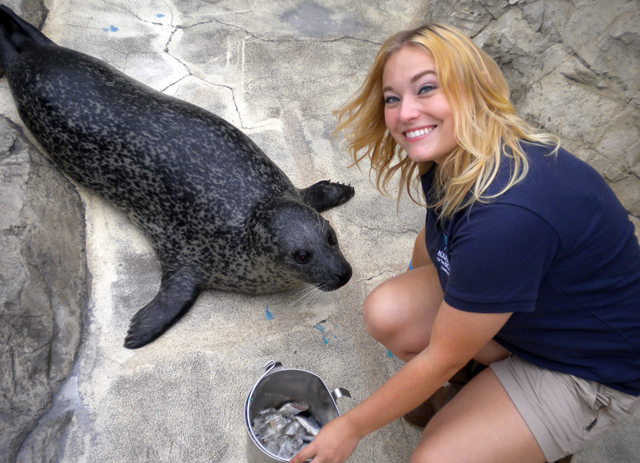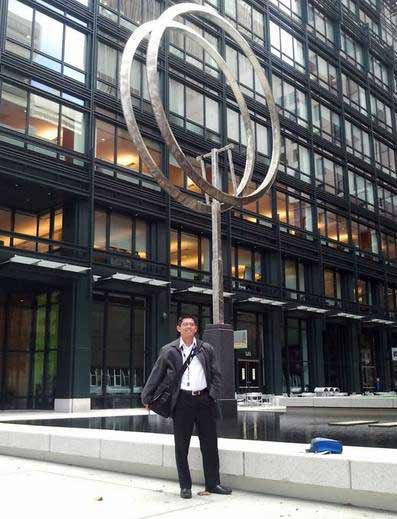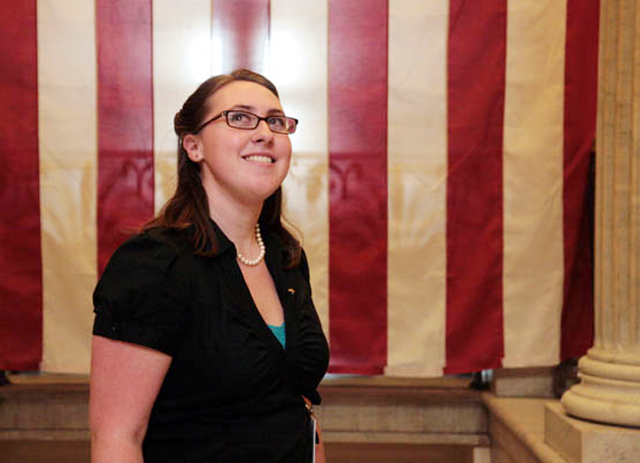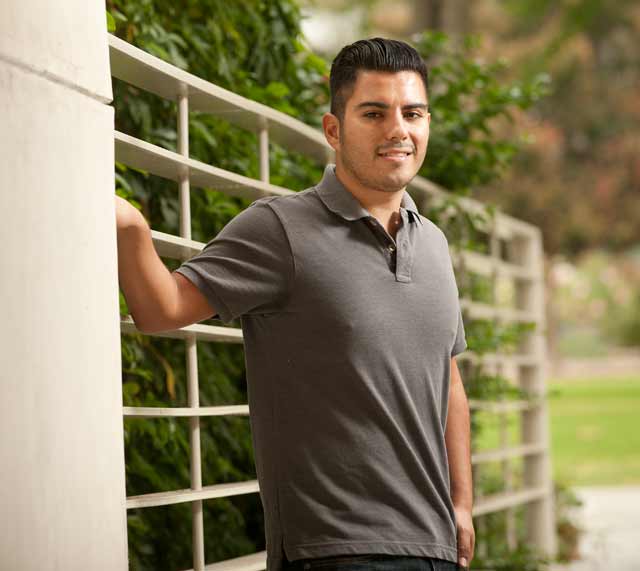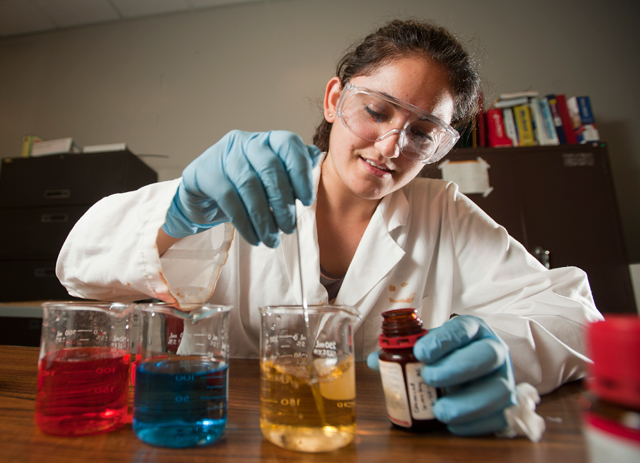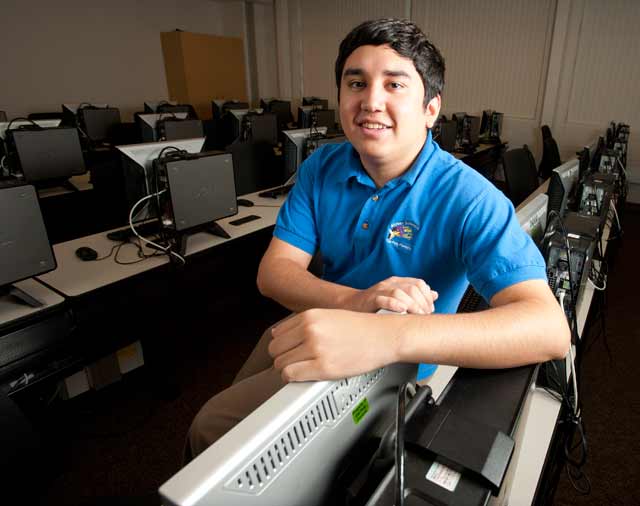For many students, summer is a time to gain real-world experience, network with professionals, expand their skills and travel. PolyCentric asked a few Cal Poly Pomona students to share about their jobs and internships from the past few months.
Amberleigh Capp, biological sciences teaching credential
Summer Jobs: Marine mammal husbandry intern at the Aquarium of the Pacific in Long Beach, education specialist at Los Angeles Zoo and Botanical Gardens, teacher at School-Connection in Diamond Bar
What did you do? At the LA Zoo, I worked with families and children in the California Condor Rescue Zone, a great playspace to learn about our endangered California Condor. As an education specialist, I bridge the gap between the guests and the animals. I am there to answer questions and encourage curiosity. Also, I got to work some of our overnight campouts! Those were very fun. It is pretty neat to wake up in the night to elephants!
What was the most challenging part of the summer? The biggest challenge overall was time management. I had a 60-hour week: 20 hours of commuting, 40 hours of work. It was exhausting spending so much time in the car. I found ways to manage my time and found traffic solutions like carpooling buddies and stopping at Disneyland on the way home.
What else did you do this summer? I did take a few days off to be my sister¿s maid-of-honor. I also went to Disneyland after several of my aquarium shifts.
Heriberto Canizales, senior, accounting
Summer Job: Intern at Bechtel Corporation in San Francisco
What did you do? I helped out Bechtel Corporation¿s Tax and Audit Department pull through their busy summer season. I prepared small company returns, taking on some special projects involving an Oracle general ledger system and other software. I helped with an auditing project for work in the state of Ohio, developed Excel spreadsheets and reports, and helped with an international tax project.
What accomplishments are you proud of? I was able to get direct exposure to accounting corporate work, which helped me understand what skills employers look for and how I can acquire them. My supervisors handed me work as if I was just another employee and gave challenging projects that I could learn from. This pushed me to be more professional and to gain new accounting knowledge and skills. Also, I was given first-class mentoring by my supervisors and managers. I had the opportunity of asking my co-workers many questions in regards to career paths and professional development.
What did you learn? I learned what a job in taxation or auditing is like. This was my main goal as I really wanted to get that hands-on experience in a big corporate company before graduating. I also learned how to be detail-oriented and how to work under time pressure.
What is your best memory from the summer? My best memory from this summer was when my mom and my girlfriend visited me in San Francisco. We went to the Golden Gate Bridge, attended a San Francisco Symphony concert, and we had a fun and relaxing weekend together.
Courtney Lemon, senior, physics
Summer Job: Mather Intern for U.S. Rep. Rush Holt of New Jersey, through the Society of Physics Students Internship Program
What did you do? In general, political interns handle most of the basic office work, including, but not limited to answering phones, writing letters to constituents, distributing mail to staff, giving Capitol tours to constituents and guests, and attending hearings and caucuses for the congressional staff (or personal interest!) I also was given the opportunity to write a few articles for the online version of Physics Today. They will be posted in the near future!
What did you learn? Oh goodness, what didn¿t I learn? Every day pushed me in some way or another. The best way to phrase it is I learned to love the political system and all of its ups and downs. Each congressperson works differently. Representative Holt is such an upstanding man and he genuinely listens to his constituents, taking the time to hand sign each letter and even looking over each piece of mail to make sure that the questions are answered up to his standard. It was an honor and a challenge to work for him.
What was the biggest challenge? The most challenging aspect of the internship was taking phone calls right around the Aug. 2 deadline for the budget. Constituents would call in, each with a heartfelt story, urging the congressman to vote one way or another. Not only were we constantly on the phone (each intern probably took upwards of 40 calls a day), but we were inundated with communication. It was extremely challenging, and also extremely rewarding to see so many people actively involved in their government.
What is your favorite memory from the summer? There¿s definitely too many awesome activities that I participated in this summer to limit it to just one! The biggest highlights were probably meeting and genuinely getting to (somewhat) know a Nobel Laureate, sitting on the floor of the House, hearing Colin Powell speak, or the Congressional Baseball Game with all of the interns from my office, as well as the other Mather Intern (Democrats versus Republicans!).
For more information about Lemon¿s internship (only two people are chosen as Mather interns each year), watch her final presentation or read her weekly journal entries and look through her Twitter feed.
Octavio Gamboa, teacher credential student
Summer Job: Resident advisor and mentor for the Apprenticeship Program of the Institute of Educational Advancement at USC
What did you do? I stayed with students in the USC Residence Halls for the summer. I mentored and helped them evaluate career and educational opportunities. I also took care of logistical responsibilities such as driving students to and from their internships and on excursions to the beach, LACMA, the Getty, etc. My favorite part was simply engaging with students in extracurricular activities such as sports and leadership games.
Name three accomplishments you¿re you are proud of. Forming great relationships with the apprentices. I still keep in touch with and mentor some of them now. Creating a community and safe space for all students in the residence hall. I believe all students should feel as if they are part of the community in order to learn from each other and thrive together. I am also proud that I worked in an educational atmosphere this summer as opposed to an area that I am not interested in where I could have made more money. Working in education is something that I am very passionate about. I want to enter a career in education because I automatically get satisfaction from this work.
What is your best memory from the summer? My best memory was reading the letters and notes received from students at the end of the program. Reading these notes made it clear that I had a positive impact on various students.
Next summer¿ I will be grateful for a wonderful year of student teaching and I will travel to South America or Eastern Europe.
Michelle Chebeir, senior, chemical engineering
Summer Job: Research student for professors Winny Dong and Tanya Faltens
What did you do? My project was on water treatment using magnetic nanoparticles. I was focused on removing dyes from water.
What did you learn? This research experience was very rewarding. I was able to learn a lot of lab techniques and get trained on several lab machines. I also had the ability to decide my own direction of this research and design my own experiments. I think we at Cal Poly Pomona are very lucky because we have the chance to do this hands-on work as undergraduate students.
What was your biggest challenge? In the beginning, it was a challenge to pick a topic that related to something I was interested in as well as something useful that hadn't been done before. Now after all the experimentation, the hardest part is finding out the reason was everything is happening.
Next summer… I hope to get an internship or possibly publish my research.
Alexander Gutierrez, senior, computer science
Summer Job: Research assistant for Professor Amar Raheja through the McNair Scholars Program
What did you do? I tested various configurations of artificial neural networks in order to create an application that could read handwritten numbers off of an image that had other objects. Artificial neural networks are an attempt at closing the gap between conventional computers and the organic brain. The brain is composed of billions of interconnected neurons that form a web of neural impulses. An artificial neural network is a software simulation of this web by using interconnected nodes that compute input signals using a transfer function and transmit the resulting signal to the next nodes.
What is your favorite memory from the summer? Spending time with other members of the Cal Poly Pomona McNair cohort. This was probably the most significant and unexpected experience. There was such a wide variety of intelligent students dedicated to their research in different fields from all corners of the university from mechanical engineering to kinesiology. We helped each other when we had problems or when we wanted criticism in order to improve our work. By the end of the program, everyone was a friend.
What else did you do this summer? I continued to rehearse with the Bronco Pep Band in preparation for the upcoming school year.


